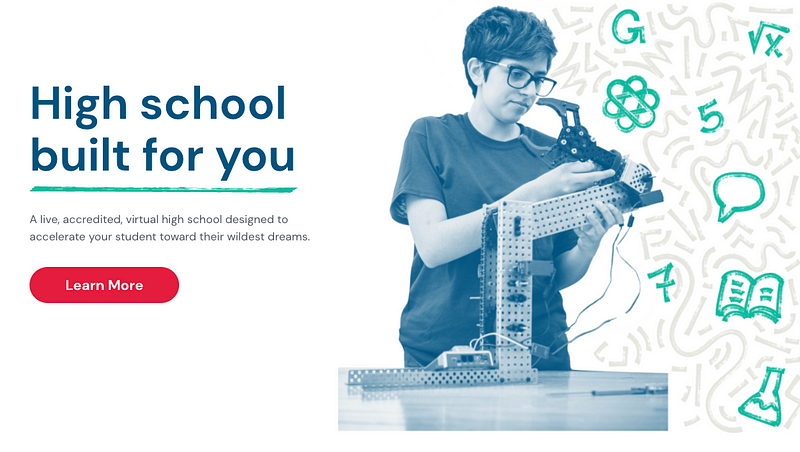Learning innovation with Sora, Galileo, and Prisma.

Education visionary Sir Ken Robinson once said:
“Our task is to educate their (our students) whole being so they can face the future. We may not see the future, but they will and our job is to help them make something of it.”
Yet, many kids grow up in an education system that stems from the industrialized age. Most schools batch children by age and expect them to learn at the same speed with the same means.
Connected Learning Networks follow a new paradigm. The approach to learning is defined as “learning that is socially connected, interest-driven, and oriented towards educational, economic, or political opportunity.”
Here are three schools that build on Connected Learning Networks and how they might shape the future of education:
1) Sora — High school built for you
Sora is a virtual high school that aims to accelerate students toward their wildest dreams.
Teachers are no longer teachers who deliver lectures but so-called guides who challenge students, structure individual curricula, and facilitate learning.
Sora offers various learning formats:
- Independent projects. Students follow their learning interests (e.g., computer science or 18th-century Victorian fashion) and work towards their project goal.
- Learning expeditions. Live learning sessions (e.g., saving the coral reef and shellfish industry) happen three days a week. These expeditions have deliverables, and students are assessed based on a mastery scale.
- Career tracks. Learning advisors help students design their school experience around their desired career track, e.g., engineering, design, or health sciences.
Here’s what a typical schedule at Sora looks like:
A Day at Sora
9:30am daily standup on discord
10:00am project work (e.g. programming a game or writing a book)
11:00am first learning expedition (e.g. history of buddhism)
12:00pm lunch break
12:45pm second learning expedition (e.g. saving the coral reef)
3:00pm afternoon checkpoint
4:30pm 1-on-1 check-in with experts to work through questions
5:00pm virtual club (e.g. movie club, school feedback sessions)
Tuition is $3,600 to $9,600 per year with flexible tuition options for families with a non-working parent or any extenuating circumstances.
The school was founded by Wesley Samples, Indra Sofian, and Garrett Smiley. They have work experience in venture capital, content marketing, as well as financial and entrepreneurship education.

I rate this approach 2/5 — Here’s why:
I love how Sora rethought curricula and moved away from a factory schedule. Their learning design can indeed foster self-directed learning enthusiasts.
What’s also great is the mastery-based curriculum where skill levels go along with learning science (e.g., 0 for exposure, 1 for recognition and recall, 2 for elaboration, 3 for application, and 4 for transfer).
Moreover, I like is their student focus. They state: “Schools suck because they are so far removed from the students that they serve. Our students know that we hear them, and though we make mistakes, they know that we all can learn from them.”
Yet, there are a few aspects that make me question Sora schools. First, their curriculum isn’t holistic. I can’t see subjects that focus on relationships, physical education, or arts.
Their site says, “relationships are one of the most important aspects of an education.” But a virtual book club isn’t enough to reinforce social skills.
Sora also lacks a clear roadmap to physical education. There’s the subject on an exemplary grade certificate. Yet, there’s neither a sports teacher on the team list nor a subject in their curriculum.
The online school doesn’t seem to offer art classes. It’d be great to take a more open approach to career tracks. Next generations need more than engineers, designers, and health scientists.
Sora seems like is the perfect school for parents who can’t wait for their students to join the high-achieving workforce.
2) Galileo — Online self-directed global school
Galileo is a global learning community for 8 to 18-year-olds. They offer live learning experiences and online courses.
At its core, Galileo strives for self-directed (the freedom to choose what you want to learn) and self-organized (the freedom to design your daily schedule) education.
Their mission is to improve the way we learn. Here’s how they do it:
- Clubs such as Minecraft education, history clubs, coding, or theater clubs. These are ongoing teacher-led experiences where students connect and collaborate on topics of their interest. Students may join clubs on a week-to-week basis.
- Nanocourses such as Logo design, artificial intelligence, space exploration, food innovation, or photography. They are 1-month project-based courses where the students learn a new skill. Students present their products during the final week of the course.
- Bootcamps on game development, anthropology, or documentary making. There are two or three-month-long project-based learning experiences to inspire and give students a jump start on topics they want to learn about.
The school states the schedule looks different for every student, but here’s an example of how it might look like:
A Day at Galileo
9:00am daily check-in
9:30am 3D modeling club
11:00am Spanish club
1:00pm psychology crash course YT
3:00pm Math Khan - decimals
5:00pm Dance ballet
Their curriculum builds on existing solutions like Khan Academy, BrainPop, CodeCombat, Coursera, CrashCourse, or Duolingo. In addition, they invite mentors for inspirational speeches.
Tuition is $300 per student per month or $2000 per student a year (with a 20% siblings discount).
Kelly Davis and Vlad Stan founded Galileo. Kelly has taught in various countries throughout Asia, and Vlad is a serial entrepreneur.

I rate this approach 3/5 — Here’s why:
The school’s founders share a noble motivation: “ We want you to be obsessed — or at least passionate — about the topic you are teaching, no matter if your passion is related to the core curricula or it’s just something completely different you pursued on your own.”
Galileo offers a holistic curriculum that includes dancing, singing, writing, languages, coding, maths, books, science. In addition, they provide more than 70 live learning experiences that go beyond economics and business skills.
Unlike Sora, they add a personal layer to online learning. They have student-led check-ins and local dojos — small, local, in-person learning experiences. So far, these local communities exist in Romania, Japan, the USA, Kenya, and Portugal.
They give people the opportunity to individualize their kids’ curriculum, and their team shares a passion for lifelong learning.
Yet, I’m not sure whether un- and deschooling with local dojos encompass the future of education is. So, while Galileo is an interesting niche product, I can’t see how this solution would work at scale.
Galileo seems like is the perfect school for world travelers and digital nomads who want to offer their kids connected, self-directed, world-class education.
“We have to personalize education, not standardize it.”
— Sir Ken Robinson
3) Prisma — The world’s first connected learning network
Prisma is a personalized, full-time online school for 9–14-year-olds. They reinvent learning.
Their vision is to create the world’s most effective and inclusive Connected Learning Network dedicated to preparing millions of kids for life and work in the 21st century.
Prisma offers various formats to their students:
- Peer cohorts. A group that meets daily to collaborate, socialize, and learn with.
- Coaching. Learning coaches meet and assist with learning on a daily basis.
- Live workshops. A selection of virtual workshops that focus on communication, collaboration, and critical thinking. According to their website, these workshops are optimized for engagement.
For students, a typical schedule looks like this:
A Day at Prisma
10:00am standup
10:30am independent learning routines (e.g. math, English, arts)
12:00pm lunch
1:00pm live workshops (e.g. debates, strategy simulation, writing)
3:00pm projects
3:30pm coach-learner 1-on-1 (once a week)
Prisma didn’t copy and paste a bricks & mortar curriculum to online videos. Instead, they’ve custom-designed their learning content.
Unlike other programs, this school places a focus on inclusion: “Each learner, regardless of disability status, develops an individualized learning plan along with their Learning Coach and family.”
They do so by adjusting individual learning plans, for example, through more structure or learning accessibility.
The school enrollment works in 6 x 5-week learning cycles per year and costs $7415 a year. In addition, Prisma offers financial support options to support 40% of learners in each cohort.
Prisma was founded by serial entrepreneurs and parents Victoria Ransom and Alain Chuard. They built Prisma as a quest to reimagine school and for their children.

I rate this approach 4/5 — Here’s why:
Prisma mastered many aspects I missed at Sora and Galileo.
Most importantly, their curriculum is holistic. They didn’t transfer the core curriculum to the online world but created their own learning framework consisting of:
- Foundational knowledge (language literacy, numeracy, history, technology literacy, and science principles)
- Powers (creativity, critical thinking, communication)
- Perspectives (global perspective, empathy & compassion, mindfulness)
- Practices (collaboration, design thinking, reflection, discussions, self-care)
- Mindset (self-efficacy, emotional awareness, purpose, growth mindset, ownership & self-direction, love of learning).
Prisma also mastered to include physical education in a virtual learning environment. They acknowledge the difficulty of physical online education but have found three solutions that seem to work for their students:
- Live dance, yoga, and fitness instructors
- Fitness and other off-screen breaks that encourage movement
- Fitness badges by joining athletic endeavors in their local community
Moreover, they relied on learning evidence and eliminated grading: “There has been considerable research showing that grades reduce kids’ intrinsic motivation and encourage them to do ‘just enough’ rather than their best.”
I’d be curious what students say about the rather big group size with 50–70 learners per cohort and 12–18 learners per coach. In an online setting, this appears to make personalization difficult.
While their site states they’re a global online school, admission is only open to anyone who can operate in US time zones. So unless parents want to mess up with their child’s sleep cycle, Prisma is instead a US online school.
Prisma is the ideal online school for US homeschoolers and kids who don’t like traditional schooling.
In Conclusion
The application of Connected Learning Networks is still very young. Sora and Galileo started in 2018, Prisma in 2020.
These three online schools point us towards the future of education — personalized, global, and student-centered.
Yet, we mustn’t forget the entry barriers. To provide fair innovative learning experiences, all students need equitable access to devices, reliable wifi, and a safe place to learn.
Unless we focus on providing these resources to all students, Connected Learning Networks will further increase the digital gap among income levels.
Want to feel inspired and improve your learning?
Subscribe free to The Learn Letter. I read a book and 50 articles a week, and each Wednesday, you’ll receive the best in your inbox. This newsletter will make you find tools and resources that help you on your path to health, wealth, and wisdom.